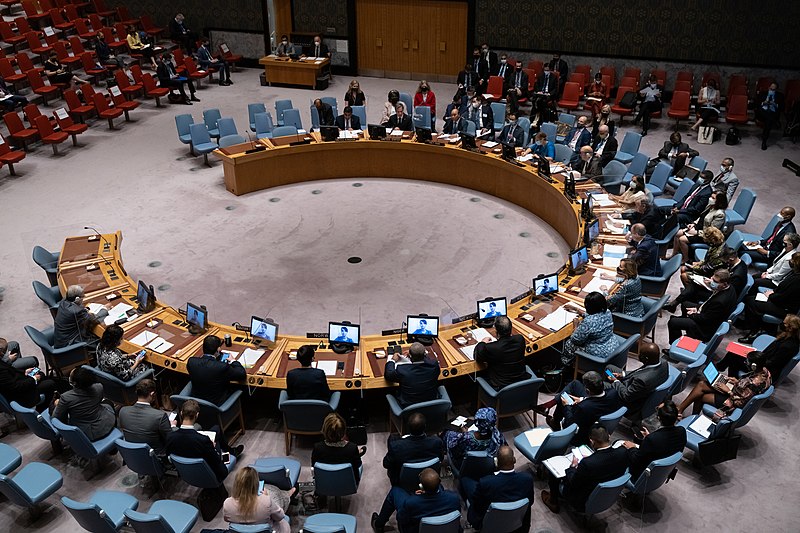Afghanistan continues to experience a humanitarian crisis to this day, with countries and organizations scrambling to come to its aid without passing through the Taliban. During the latest UN Security Council meeting, US officials took a swipe at China over human rights work in Afghanistan.
During the UN Security Council meeting Wednesday for Afghanistan, the US and Russia had opposing opinions on the organization’s role in Afghanistan. While Washington called for stronger support towards human rights work in Afghanistan, Moscow opposed, saying that the human rights aspect of the political missions does not need to be reinforced.
Anna Evstigneeva, Russia’s deputy ambassador to the UN, said the mission “should not become a kind of a supervisor to meet the interests of those who are not ready to help Afghans without preconditions.”
This comes as the UN political mission’s mandate is set to expire on March 17.
US deputy ambassador to the UN Jeffrey DeLaurentis said that Washington supports the political mission’s human rights monitoring functions and role in humanitarian coordination. DeLaurentis then took a swipe at China, saying that Beijing spends more time criticizing the actions of the US “than focusing on helping the Afghan people themselves.”
DeLaurentis noted that China is the second-largest contributor to the United Nations. “What China has done to help the people of Afghanistan or contribute to regional security does not match that standing,” said DeLaurentis.
Meanwhile, Iran’s representative to the UN Zahra Irshadi said that Afghanistan’s assets should not be politicized, calling to unfreeze the assets of the country, saying that the funds belong to the Afghan people. Irshadi cited the UN Secretary-General’s report about the situation in Afghanistan and the effects it has on global peace and security.
“If Afghanistan’s current situation is not addressed, it will lead to a collapse in the country’s political and societal system that will then trigger an influx of refugees to the neighboring countries. The International Community needs to fulfill its responsibility towards Afghanistan’s neighbors,” said Irshadi.
Irshadi also reiterated the importance of having an inclusive government in Afghanistan. The Taliban has insisted that their interim government is inclusive.



 Trump Allegedly Sought Airport, Penn Station Renaming in Exchange for Hudson River Tunnel Funding
Trump Allegedly Sought Airport, Penn Station Renaming in Exchange for Hudson River Tunnel Funding  Pentagon Ends Military Education Programs With Harvard University
Pentagon Ends Military Education Programs With Harvard University  Trump Endorses Japan’s Sanae Takaichi Ahead of Crucial Election Amid Market and China Tensions
Trump Endorses Japan’s Sanae Takaichi Ahead of Crucial Election Amid Market and China Tensions  Missouri Judge Dismisses Lawsuit Challenging Starbucks’ Diversity and Inclusion Policies
Missouri Judge Dismisses Lawsuit Challenging Starbucks’ Diversity and Inclusion Policies  U.S.-India Trade Framework Signals Major Shift in Tariffs, Energy, and Supply Chains
U.S.-India Trade Framework Signals Major Shift in Tariffs, Energy, and Supply Chains  Trump Signs “America First Arms Transfer Strategy” to Prioritize U.S. Weapons Sales
Trump Signs “America First Arms Transfer Strategy” to Prioritize U.S. Weapons Sales  US Pushes Ukraine-Russia Peace Talks Before Summer Amid Escalating Attacks
US Pushes Ukraine-Russia Peace Talks Before Summer Amid Escalating Attacks  Norway Opens Corruption Probe Into Former PM and Nobel Committee Chair Thorbjoern Jagland Over Epstein Links
Norway Opens Corruption Probe Into Former PM and Nobel Committee Chair Thorbjoern Jagland Over Epstein Links  Ohio Man Indicted for Alleged Threat Against Vice President JD Vance, Faces Additional Federal Charges
Ohio Man Indicted for Alleged Threat Against Vice President JD Vance, Faces Additional Federal Charges  Nighttime Shelling Causes Serious Damage in Russia’s Belgorod Region Near Ukraine Border
Nighttime Shelling Causes Serious Damage in Russia’s Belgorod Region Near Ukraine Border  Trump’s Inflation Claims Clash With Voters’ Cost-of-Living Reality
Trump’s Inflation Claims Clash With Voters’ Cost-of-Living Reality  U.S. Announces Additional $6 Million in Humanitarian Aid to Cuba Amid Oil Sanctions and Fuel Shortages
U.S. Announces Additional $6 Million in Humanitarian Aid to Cuba Amid Oil Sanctions and Fuel Shortages  Trump Says “Very Good Talks” Underway on Russia-Ukraine War as Peace Efforts Continue
Trump Says “Very Good Talks” Underway on Russia-Ukraine War as Peace Efforts Continue  TrumpRx.gov Highlights GLP-1 Drug Discounts but Offers Limited Savings for Most Americans
TrumpRx.gov Highlights GLP-1 Drug Discounts but Offers Limited Savings for Most Americans  Trump Backs Nexstar–Tegna Merger Amid Shifting U.S. Media Landscape
Trump Backs Nexstar–Tegna Merger Amid Shifting U.S. Media Landscape  U.S. to Begin Paying UN Dues as Financial Crisis Spurs Push for Reforms
U.S. to Begin Paying UN Dues as Financial Crisis Spurs Push for Reforms 































